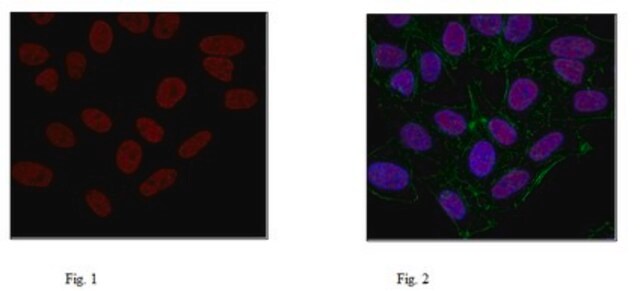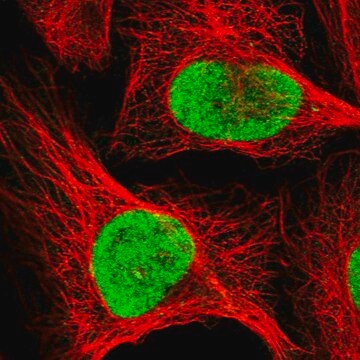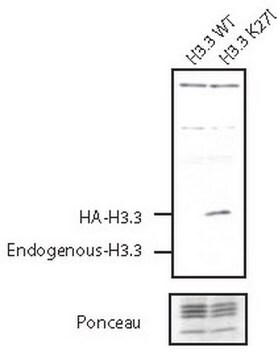ABE419
Anti-Histone H3.3 Antibody, K27M mutant
from rabbit, purified by affinity chromatography
Synonym(s):
Histone H3.1, Histone H3.3
About This Item
Recommended Products
biological source
rabbit
Quality Level
antibody form
affinity isolated antibody
antibody product type
primary antibodies
clone
polyclonal
purified by
affinity chromatography
species reactivity
mouse, human
technique(s)
ChIP: suitable
immunohistochemistry: suitable
western blot: suitable
NCBI accession no.
UniProt accession no.
shipped in
wet ice
target post-translational modification
mutation (Lys27Met)
Gene Information
human ... H3F3B(3021)
General description
Specificity
Immunogen
Application
Epigenetics & Nuclear Function
Histones
Chromatin Immunoprecipitation: A representative lot co-precipitated chromatin fragments containing the promoter regions of ACTA and CCT8 genes from HEK293T transfectants expressing FLAG-HA-tagged histone H3.3 with K27M mutation (Peter W. Lewis and David Allis, Laboratory of Chromatin Biology and Epigenetics, The Rockefeller University, New York, NY).
Quality
Western Blotting Analysis: 0.2 µg/mL of this antibody detected FLAG-HA-tagged K27M mutant, but not wildtype, histone H3.3 in 3x10E5 cell equivalent of lysate from MEF transfectants.
Target description
Physical form
Storage and Stability
Analysis Note
Lysates from MEF transfectants expressing K27M (positive) or wildtype (negative) FLAG-HA-tagged histone H3.3.
Other Notes
Disclaimer
Not finding the right product?
Try our Product Selector Tool.
Storage Class Code
12 - Non Combustible Liquids
WGK
WGK 1
Flash Point(F)
Not applicable
Flash Point(C)
Not applicable
Certificates of Analysis (COA)
Search for Certificates of Analysis (COA) by entering the products Lot/Batch Number. Lot and Batch Numbers can be found on a product’s label following the words ‘Lot’ or ‘Batch’.
Already Own This Product?
Find documentation for the products that you have recently purchased in the Document Library.
Our team of scientists has experience in all areas of research including Life Science, Material Science, Chemical Synthesis, Chromatography, Analytical and many others.
Contact Technical Service








